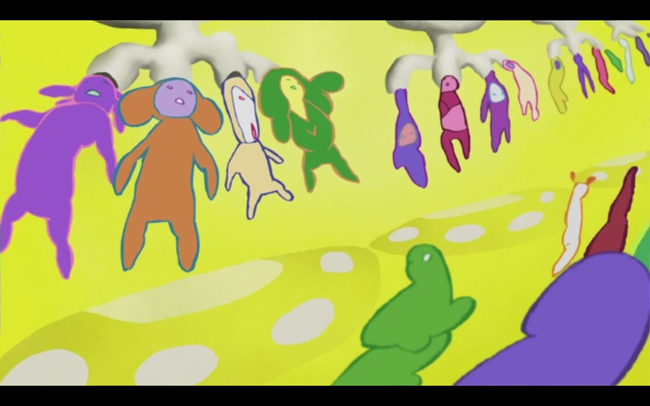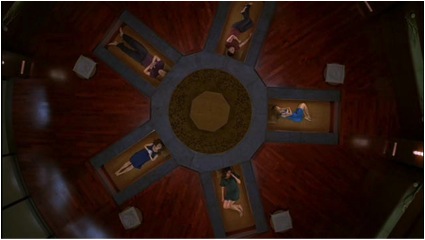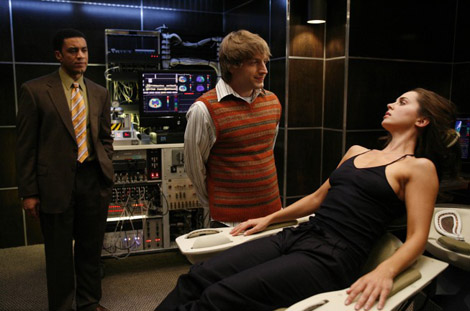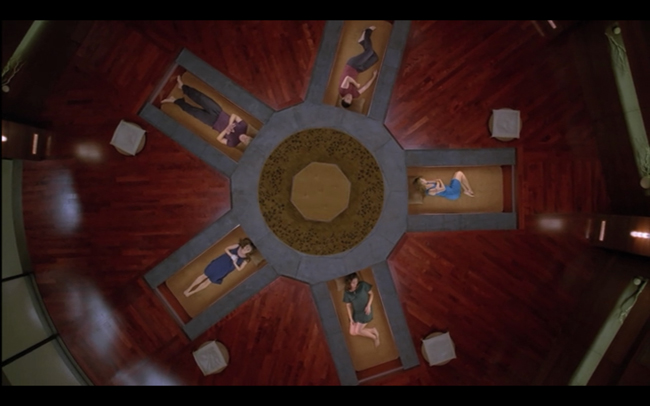
When the topic of Dollhouse comes up it’s hard to avoid a feminist reading. It’s essentially a show about sex trafficking by Joss Whedon, who proclaimed to the world that he was a feminist with Buffy the Vampire Slayer. And there is definitely a mess to untangle on the topic of Dollhouse. Its action elements, many of its ideas, and the fantasy of it all obscures the serious themes, so much so that it may reinforce the systems it is trying to decry. There is another essay to be written about all of that. But when viewed through a different lens, one that focuses more on the speculative and conceptual elements, it becomes a show about where identity lies, and how to access it.
The central conceit of the series is that a technology has been developed which allows you to “imprint” people with new memories, and take away their own memories. Brains become rewritable. Bodies and minds are separated. And in that separation, they are both commodified. There is no shortage of minds. They are able to be copied, and even created by amalgamation. The bodies are valued, but as an object to be used and manipulated. As a vessel for the exchangeable mind.
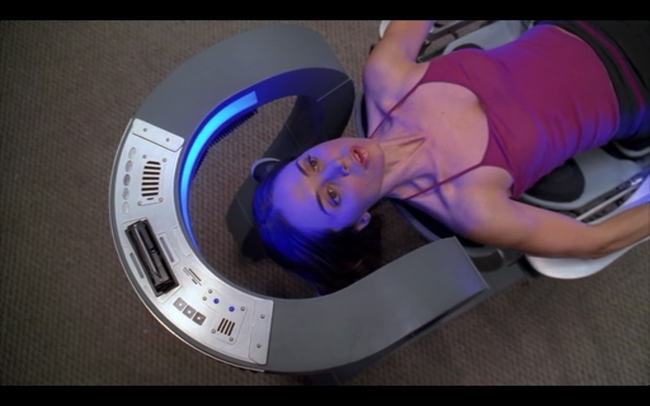
The central character in Dollhouse is Echo, who is one of the “dolls” whose mind is routinely altered. She has glitches, which lead to her retaining information between different identities. It’s something of a plot necessity, and a very literal interpretation of a standard way of making television. The viewer must feel like they have seen a self contained story, so that they can watch one episode in isolation and enjoy it, but it must have a continuing plot thread so that viewers are drawn back week after week. Echo is made into a self contained story herself, and glitches into continuity.
This glitching leads to another plot necessity: there needs to be a real Echo underneath it all. The body, or the brain, has to have an identity that is separate from the plastic and shifting mind. This self must have a strength or dignity that all of the other selves that enter and exit her body do not. The continuing plot thread must be of more importance than the episodic content, in order to keep the audience interested in what its small serial details are building to.
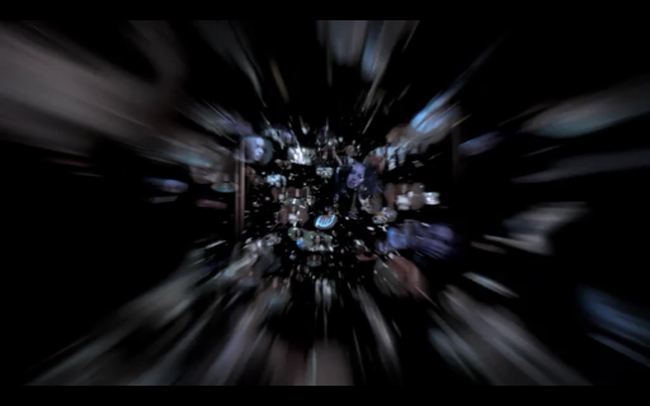
Dollhouse’s two seasons end with episodes about a dystopian future, where the technology that the series posits has led to widespread destruction. This dystopian, futuristic world is similar to the one seen in the Maasaki Yuasa anime Kaiba. Kaiba is built around a similar conceit to Dollhouse: minds can be taken out of bodies, and put into other bodies. In both, the rich hold the technology to take the bodies of others, so they do so. Bodies are routinely harvested or sold. Bodies and minds become matters of economic exchange.
In Kaiba nearly all of the characters have conical drives in the back of their heads that store their memories. Take it out, and you can put in your own. In the future of Dollhouse people can be rewritten wirelessly, but in Kaiba there is a visceral nature to the tearing out of identity. The rich constantly send drones to chase down people, take their bodies and leave their drives behind. The rich can even create artificial bodies, but living bodies are sought after for erotic appeal, fashion–whatever whim they have. And because bodies can be replaced, they are casually destroyed, while the minds of the less fortunate sit on shelves.
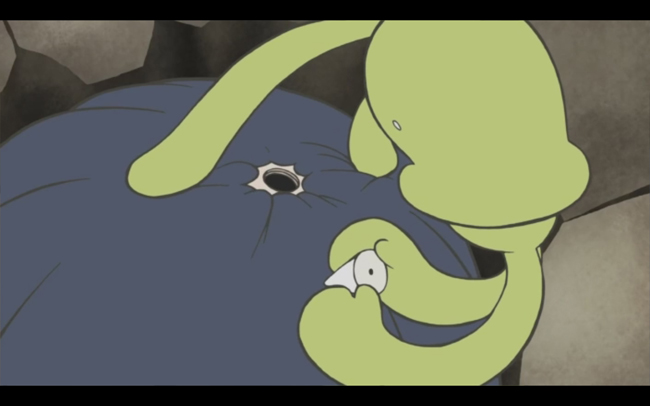
Kaiba is titled after it’s main character and also after a giant plant which eats memories, their shared name implying that they mirror each other. Kaiba as a character is much like Echo, a blank slate who is finding himself. His journey leads him through bodies, and through expectations. He moves through a silent doll, and the body of a girl whose memories were released from her body. Throughout this journey it is quietly suggested that he values the mind as well as the body. When inside the girl’s body he wonders to himself: what sort of a man did the girl like? Later, he is warned that if he stays inside a woman’s body he will lose himself. This suggests that the body is active in the creation of identity.
Kaiba’s plot is driven by much the same narrative necessity as in Dollhouse. In a world which devalues life so much and removes agency from so many, a writer feels pressure to show that someone has agency. A fantastical wasteland of hopelessness is useless to depict if the audience can feel no hope in it. If it is a rhetorical point showing that something is bad, some future is to be avoided, then it must suggest some alternative. If it does not, it becomes simply a nihilistic fantasy. Its very genre depends on the character having the power to change things.
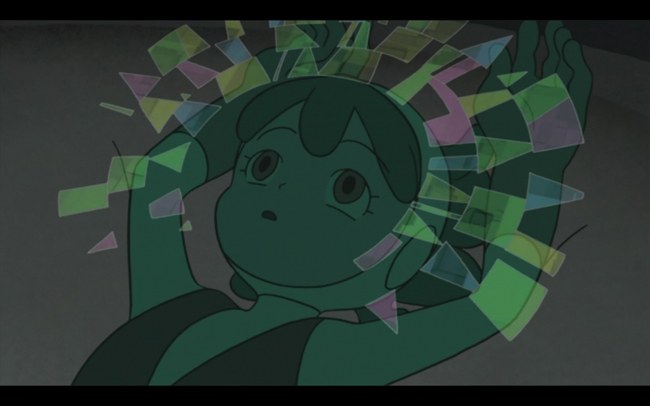
Both shows devolve into a Chosen One myth, where the traits of the main character are world changing. Echo is able to help save the world because her body produces something that can combat the effects of imprinting identities. And when Kaiba re-enters his original body he is changed into a very different character. This body was the body of the king Warp, reborn again and again and imbued with all of the memories of his planet. Suddenly filled with these memories he becomes colder, crueler. It seems that it is this memory-filled body that is like the memory eating plant: consuming memories, containing memories, but acting and defining himself independent of them.
Dollhouse seems to suggest that there is some dignity and power inherent in the body. That the true identity rests inside of it. But when Kaiba returns to his body, his body changes the character entirely. In the end, it is suggested, it is his journey through those other bodies that allowed him to overcome all of the many memories of king Warp. It was not the possession of those memories, or the virtue of the original body, it was the movement between bodies that was valuable. In much the same way, as Echo finds herself she does not do it through the memories she is given. She finds herself through the process of traveling through other identities.
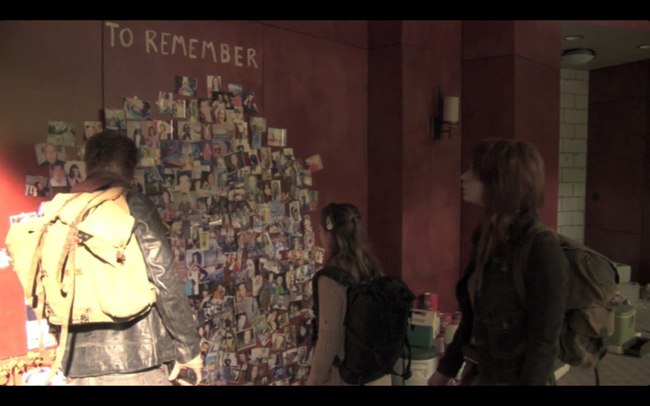
It is this that is interesting about these shows. They seem to espouse a path towards the authentic self, the self that is in some way truer and more permanent, through putting on different masks. The many bodies of Kaiba, and the many minds of Echo, both point towards the same conclusion. They found themselves through the process of existing within, and then exiting, selves. It is almost a metaphor for adolescence. Different clothes, different friends, different views–a movement through selves as a way to deal with the discovery and understanding of all of the terrifying aspects of the adult world.
There is a contradiction here, though. The constant sloughing off of people’s minds or bodies, the fetishization of one or the other: these are processes by which people are devalued. But by taking on multiple different identities, one can become a more whole person. How do those two things justify together? One is positive, one is negative, yet they describe the same phenomenon. I believe the distinction here is using the separation of mind and body as a tool for introspection rather than as a way of judging others. When looking internally, finding yourself through the facets of others is not just a positive method of self definition, it’s almost a necessity. When dealing with the outside world, viewing a person as simply a body that performs a task, or ignoring how their body informs who they are, is not going to allow you to fully relate to them. The separation of body and mind is invaluable from within a body, because the body and the mind never allow themselves to be ignored. From the outside, looking at someone else, you do not feel the limits of their body, or the emotions of their mind. If you look at only part of a person, it is much easier to dismiss them.
It all really comes down to fetishization; the separation of one trait from the others leads to the devaluing of the whole. And, I suppose if I am saying “fetishization” I haven’t gotten too far from a feminist lens. But it is an interesting detail that perhaps these shows indicate that fetishization is part of the way that we determine our own identity. That by separating identity from body, part from part, and feeling the tensions and pressures that come out of this, we are able to distinguish our own whole selves.
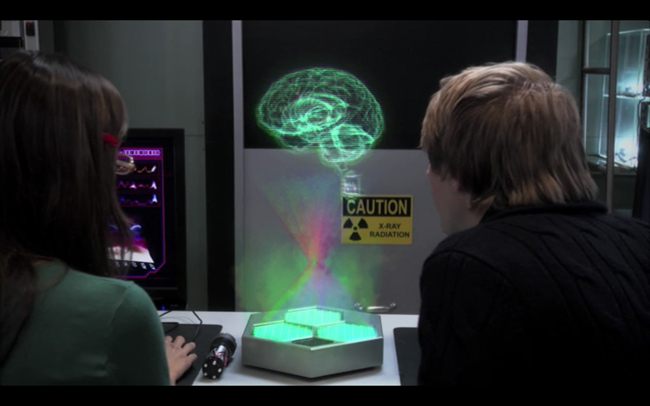
Joss Whedon’s original conception of Dollhouse was over a conversation with Eliza Dushku about her life, in which she discussed living as an actress, taking on different roles, and how the gaze of the camera determined who she is. This can lead to a very shallow reading of Dollhouse, where the whole metaphor becomes a show business commentary. But it can be viewed more broadly as about performance, about the way identity is communicated and policed.
Dollhouse is somewhat explicitly about the media, and while Kaiba is not, both come from cultural landscapes where new media are changing the way people relate drastically. Entertainment has become ever more unavoidable, showing lives and experiences we’ve never been a part of. The internet encourages separating the mind from the body, and TV and ads encourage separating actors’ and models’ bodies from who the are. The internet provides anonymity that allows many to explore different ways of being. It is hard to think that this is unrelated to the themes of series that explore taking on different experiences and performances.
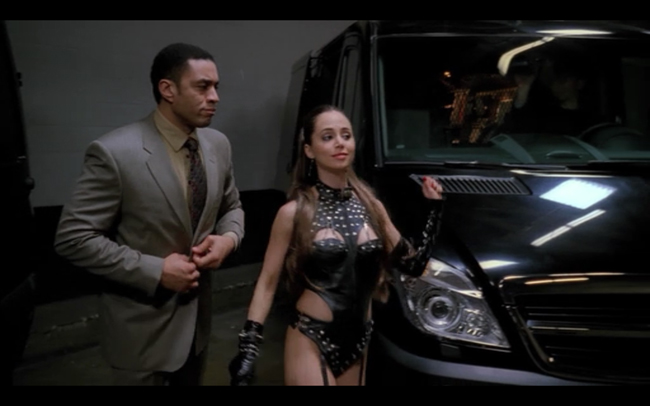
Maasaki Yuasa as a creator is somewhere between an auteur and a class clown, stylistically eschewing the usual way things are done, for deep and silly purposes. Both require a subversion of norms, but together they lead to almost “take it or leave it” meanings. The worlds he creates often seem to be created for the joy of experimentation in itself. This can lead to wild storms of color and ugliness and beauty all amounting to no particularly discernible meaning. But Kaiba as a blank slate character brings out something different. He is the innocent core of the anime. When unable to speak in his doll body, he is established as the character who listens, who moves out of a general well-meaning nature. Indeed, throughout the show he generally embodies this empathetic role. He is brought to consider the life of the girl whose body he later possesses, and the needs of all of those around him.
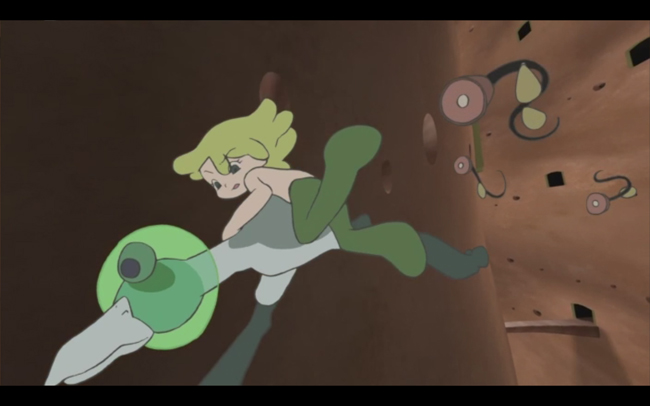
Echo becomes different people, fully being those people and therefore of course completely understanding them. But Kaiba finds who people are through looking at the world from different perspectives. Both exhibit a movement through selves, but Kaiba’s position reveals that this movement through selves is movement through understanding selves. It is a compassionate, empathetic journey.
Both Echo and Kaiba face their supposed true selves. Kaiba becomes the king Warp, Echo must finally take on the guise of her original identity Caroline. And in both cases they reject these selves. These true selves can be taken as being their societal roles, as being who all of the pressures and expectations around them would mold them into.
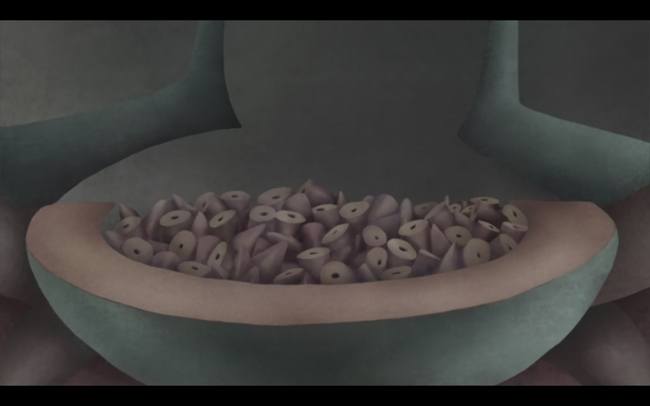
This journey of introspective development into an authentic self, then, becomes a path toward the rejection of the societal roles that we are made to perform. This is done through the varied performance of other roles. But if it’s as radical an idea as that, then comparing it to adolescent development seems to not work. Trying on different selves as you grow up is a very common experience, and in those cases societal roles do generally win out more often than not.
When the empathy element that Kaiba reveals is included in the necessities for developing an authentic self, though, it starts to fit together a bit more. Understanding the emotions, the motivations of those around you is a sort of awareness of reality, of norms. But just being aware is being like Kaiba the memory consuming plant: it’s unthinking, unreflective, of static intention. It is the process of movement through selves that is necessary. It is the process of taking apart the experiences of others, respecting and empathizing with them, as steps in a progressing conception of self. Not as an adolescent self-protection from the terror of adult moralities and complexities. It is seeing the way things are, and then making an individual choice in how to react.
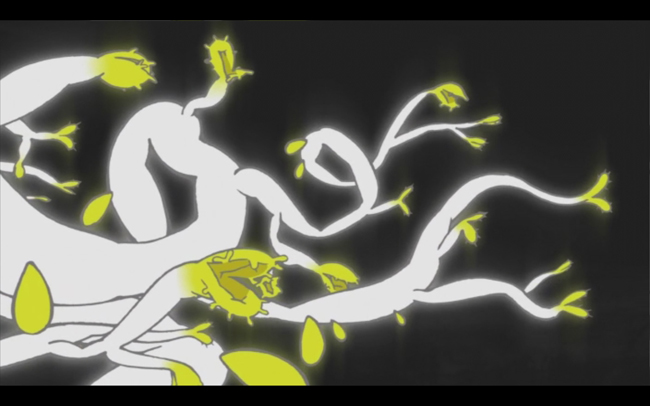
It seems that this path, this way towards an authentic self, involves a humanization of all that was fetishized and separated. The process of re-sorting the bodies and minds left strewn about the cultural landscape, using empathy to connect disconnected pieces of self, is an act that leads the one repairing it all to a more whole self. De-fetishizing what is depicted and communicated in culture is an activity that helps oneself not only because it creates a better culture, but because it actually helps the person doing it. But inherent in this is that the fracturing of cultural beings allows for this opportunity. Both series end with a vague resolution of the world into a more natural state. Minds in the bodies they came from. While this undoubtedly is good for the characters and the worlds, it is hard to not feel that some possibility was lost.
Whether this suggested path towards authenticity is able to be utilized in any real way is uncertain. Whether it is in any way preferable to the paths offered by religions, self help gurus, what-have-you is uncertain as well. But it’s origin is in the way plots are built, the logical structures of narrative. It is similar to a path of adolescent development that has helped many people adapt themselves into something new. Considering these, it seems to have validity and logical consistency to it. The way it interacts with new media and it’s murky effect on self identity shows it to have an immediate and modern function. It springs forth from a world where fetishization disconnects us, and finds in it empathy and wholeness.
